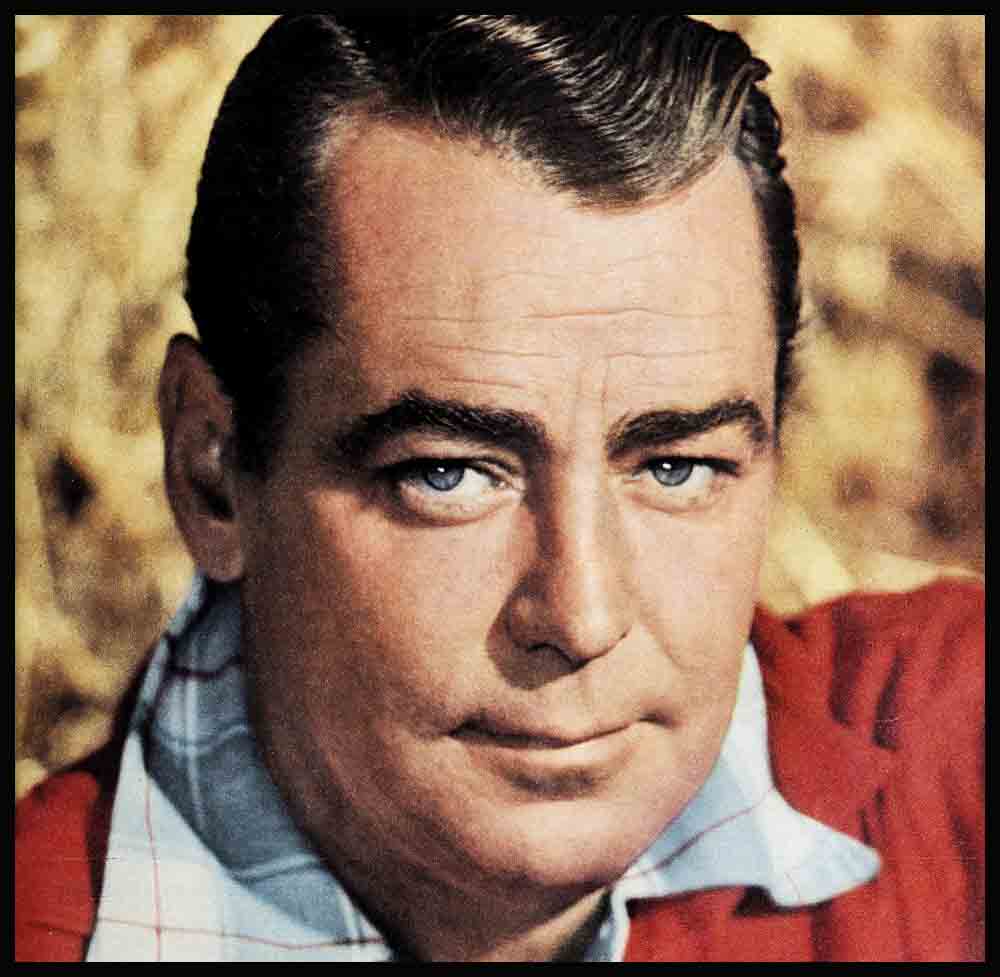
And The Heart Whispers, “Home”—Alan Ladd
Of all the people in Hollywood who might be expected to spend two years abroad, we Ladds are the least likely. Alan’s a true home and family man. He loves his own hearthside, and nothing but his job can take him away from it. Only his job did. Now that we’re back, Alan’s like a little boy, excited, grinning over each moment of each hour that allows him to enjoy our home.
All the rooms of our beloved house in Holmby Hills seem to enfold us tenderly, returning the affection that we poured into their planning. After two years of living in hotels or rented BY
houses, however charming, it’s wonderful to be surrounded by furnishings we chose ourselves, each of them a rich reminder of an earlier moment of happiness.
And, for Alan, David, Alana and me, there’s a joy much deeper in being with Carol Lee and Laddie again. You see, when we first went abroad in the fall of ’52, the entire clan went along. And then, when we went to Canada the following summer, we all came back together again. But when we returned to Europe for the second time last fall, we had to leave the two older children behind—so they could continue their schooling in California.
The family was separated for the first time. Somehow, we never got used to the fact. Every so often, while we were away, we’d find ourselves automatically including Carol Lee and Laddie in our plans, turning to address a remark to one or both of them—and then flinching at the unhappy realization that there were thousands of miles between us. Now the six of us are together again, and that’s the finest experience of our homecoming.
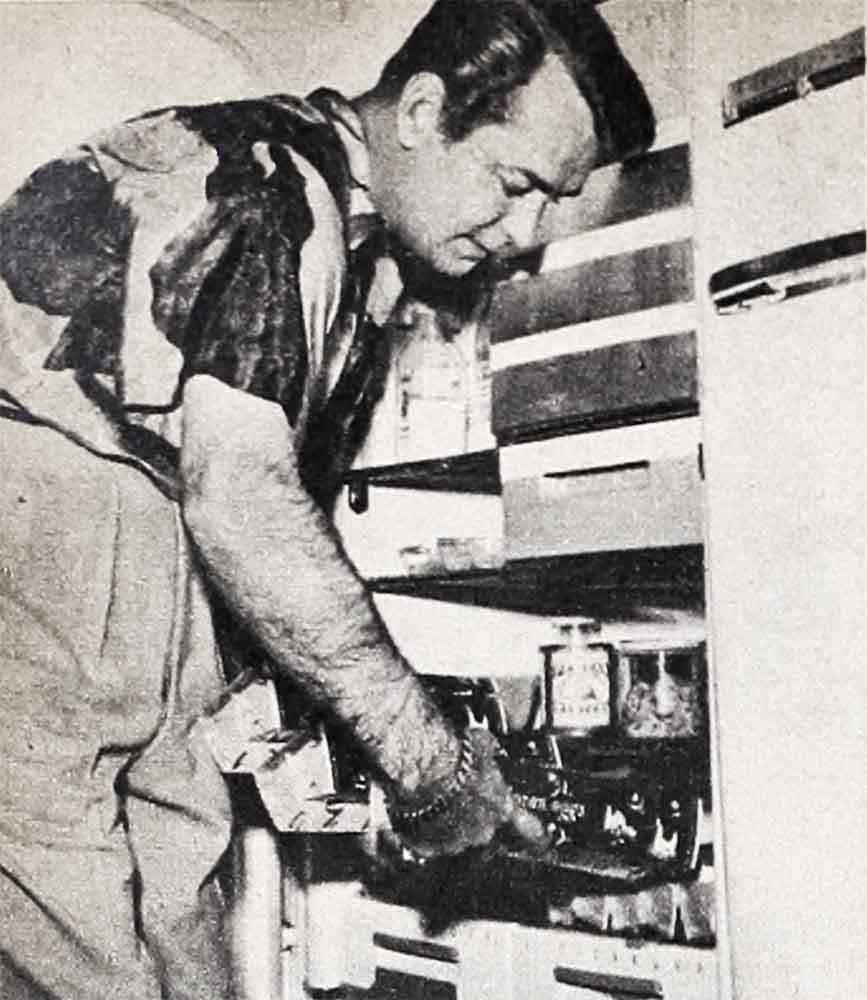
During the months of separation, our hearts came home before we did, drawn not only by the two absent children, but by special longings, different for each of us and sometimes amusingly unexpected in character. Who do you think was the person Alana was most anxious to see? Her dentist! While we were in Europe, she broke her braces, and she was sure her teeth would never be straight. Believe it or not, David looks forward to each session of school as if it were a visit to the circus. Of course, the children’s education wasn’t neglected while we were away; we took a schoolteacher with us even while we toured the Continent between Alan’s pictures. But David was eager to go to an American school, like Laddie.
For my part, I felt I was really back when I found myself in my American kitchen, reveling in all the gadgets you | take for granted—until they’re missing. My refrigerator, for instance, has become an object of art in my eyes. Highclere, the beautiful old English house we rented when Alan was working in “Paratrooper” and “Hell Below Zero,” had no refrigerator at all. With the cook’s help, I learned how to get along by keeping perishables in the larder. But David wasn’t so quickly won over. Practically every morning he’d say, with subtle reproach, “Some cold toast and warm milk, please.”
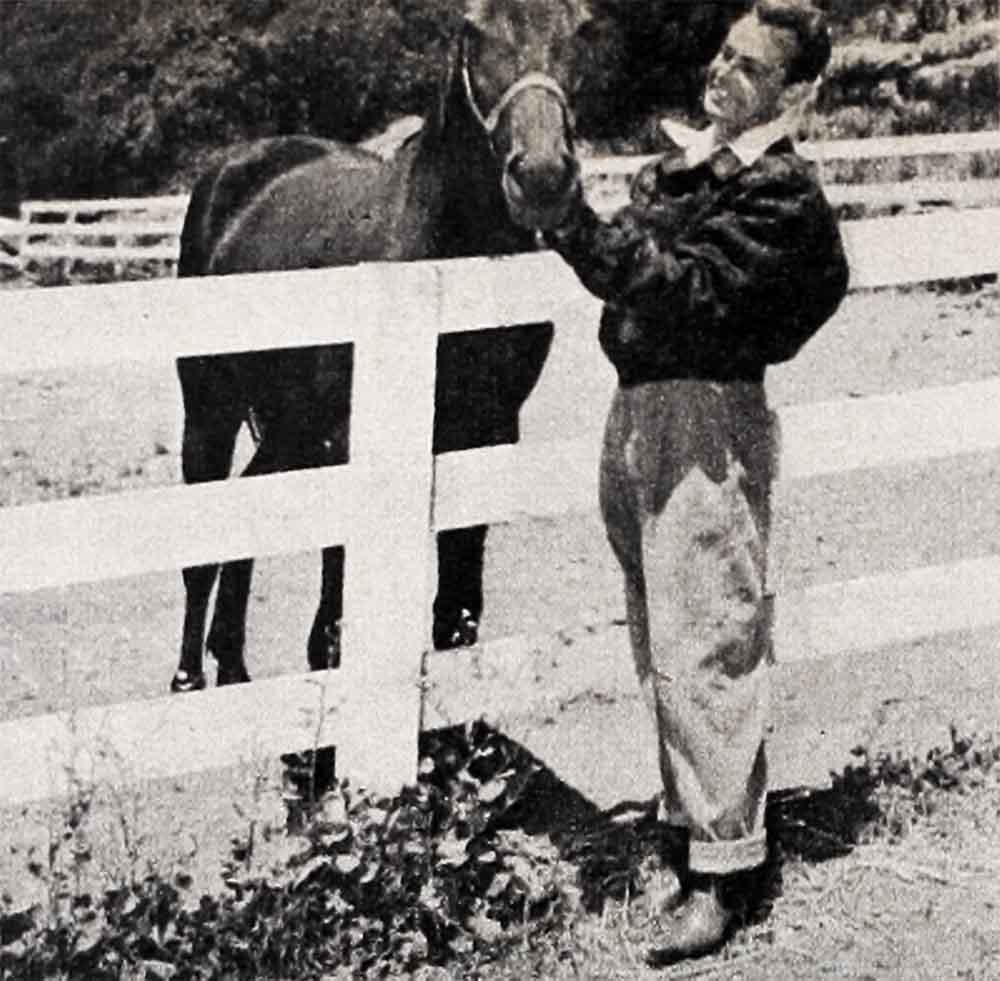
Alan is a gleeful man these days, busy in his own cooking domain, the indoor barbecue. He was back here in spirit at least once during our tour of Europe. We’d been wistfully ordering hamburgers all along the way, but the chefs had no idea what we meant. Finally, at a restaurant in Cannes, Alan explained to David that hamburger was a sacrifice he’d have to make.
“I’ve got an idea, Daddy,” he said. “You make the best hamburgers I ever ate. Why can’t you make ’em here?”
The maitre d’, hovering over us, must have been psychic—or else he could understand English. He snapped his finger, bowed my husband out of his chair and escorted him to the kitchen. There, the chef brought Alan a white apron, a big bowl of chopped meat and a skillet. All the kitchen help gathered around to watch, and the presiding genius of the Ladds’ home barbecue went to work. He must have gone on making hamburgers for an hour! David, Alana, Carol Lee, Laddie and I all had our fill, and then orders started pouring in from other American guests for “Alan Ladd Hamburgers.” For the rest of our stay in Cannes, “Hamburgaire Ladd” was a standard item on the luncheon menu with Alan as chef.
He was enjoying himself, sure. But now he’s really in his element, with our close friends as guests, waiting to sample the products of his art. A skillet that’s just the right size hangs on the wall, ready to his hand. A good fire’s going, and the glow of it, lights the face of a happy man.
In Germany, Laddie discovered another way to get a home-style hamburger. He persuaded us to stop at one of the canteens run by the U. S. Government for American personnel overseas. In and out in a moment, he reported, “You’ve got to have government scrip to buy anything there. They won’t take cash.” But then he had a second thought. He felt sure that they wouldn’t mind treating a family of hungry fellow Americans to hamburgers. And he was right. We spent about an hour talking with the homesick and very friendly GI’s, savoring the welcome sound of their American accents. They wanted to know all about Hollywood and the way we live here, and just describing our home and our friends made us feel closer for a while to faraway Holmby Hills and our ranch in Hidden Valley, which we yearned for so.
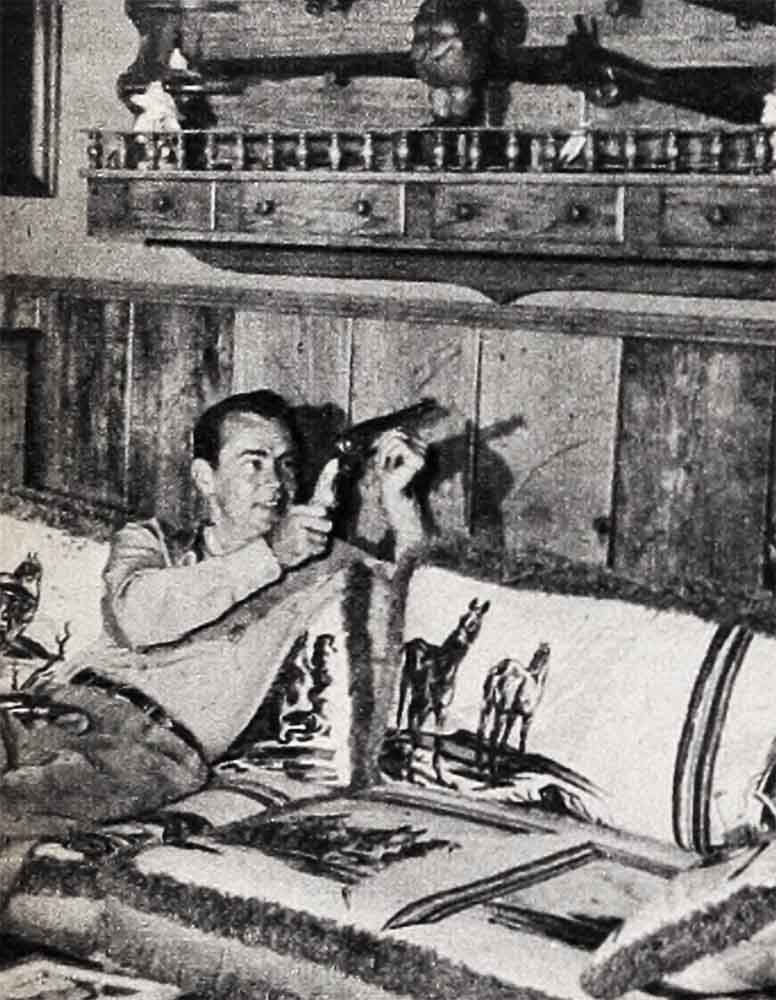
Hamburgers, I guess, were for us a symbol of things American. And the children tried in their own way to import bits of the United States wherever we lived. David and Alana, looking forward to Hallowe’en as all American children do, were dismayed to find that the British pay little attention to this holiday. Determined to celebrated it anyhow, the pair settled on a substitute—Guy Fawkes Day, a historical holiday which falls a week later. They daubed their faces, put on ragamuffin clothes and set out to demand tricks or treats. The staid English country people were astounded to find a couple of little American hoodlums ringing their doorbells, but they were generally hospitable,—until David and Alana reached the home of two elderly spinsters. One of these ladies, suppressing her first reaction of horror, invited the children in and began a polite conversation, while the other rushed to the telephone and got through to the local constabulary. The ladies were convinced that David and Alana were decoys for a major robbery!
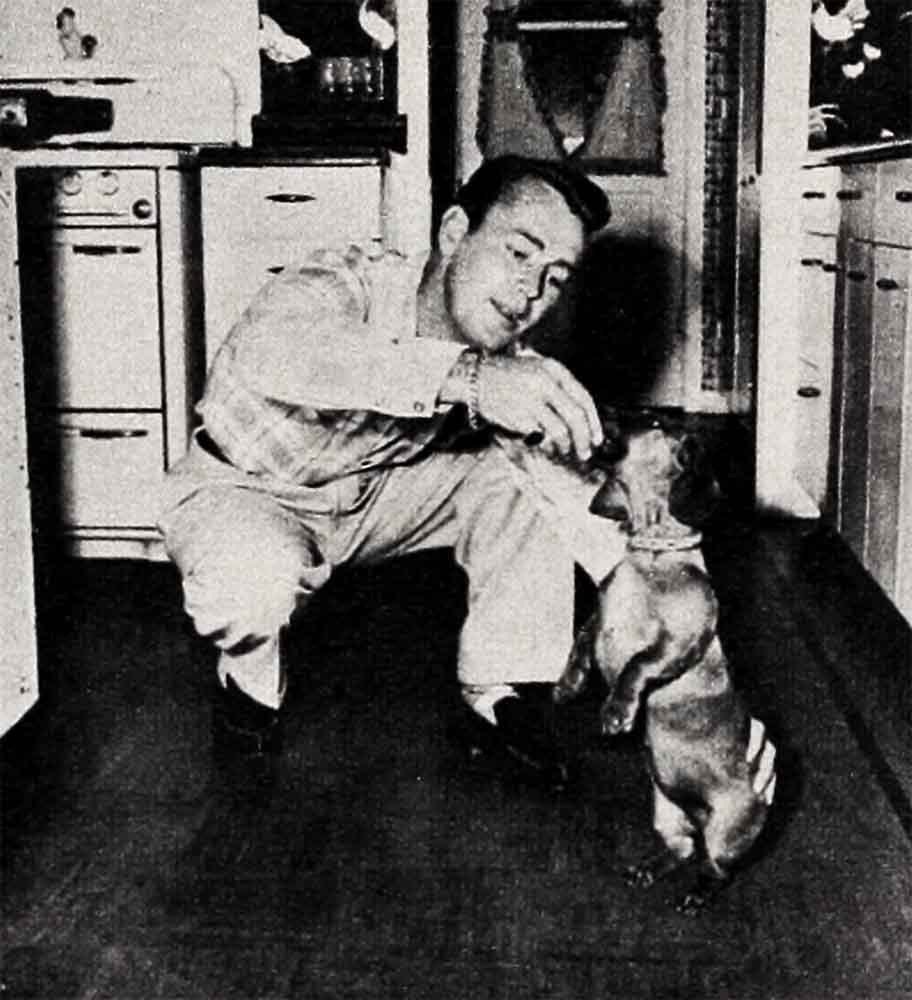
It was our turn to be equally horrified, when our small-fry arrived home in a policeman’s charge. He was simply checking on their story that they were the children of a perfectly respectable American movie star. Alan took over and explained gently to the children that a lot of our customs seem as strange to the British as many of theirs do to us. The constable got on the phone to assure the ladies that they weren’t in any danger. Then Alan and I sealed the pact by inviting the ladies to tea at Highclere the next day.
New friendships often helped to soothe the pangs of homesickness, and Alan’s fans, too, made us feel welcome everywhere.
Once, three or four cab-loads of London fans followed us all the way out to Highclere, at least an hour’s drive, so we asked them to come in and talk with us. Months later, when we were ready to leave, Alan’s fans offered to give him a farewell tea. Deeply touched, he and I decided that this was the wrong way around, that we should be entertaining them. Alan chartered buses to bring them out from London, and I planned simple refreshments to be prepared at home. On the morning of the big day, the president of the fan club phoned to say that there would be about four hundred guests!
There was a crisis in the kitchen. But a near-by caterer was called into action, the whole family helped to pass the tea goodies around, and the party was a complete success.
An unexpected visitor that afternoon was Rock Hudson, who was making a movie in England at the time. He dropped in as goodbyes were being said, and we greeted him enthusiastically, as a big, cheerful reminder of home. Finally, we relaxed in the living room to wait for dinner, along with Rock and a pretty young girl. Alan and I felt awkward because we didn’t know her name. We assumed that she was a friend of Rock’s, and that he’d forgotten to introduce her, during the flurry of fan farewells. Meantime, Rock (we discovered later) assumed that she was a friend of ours.
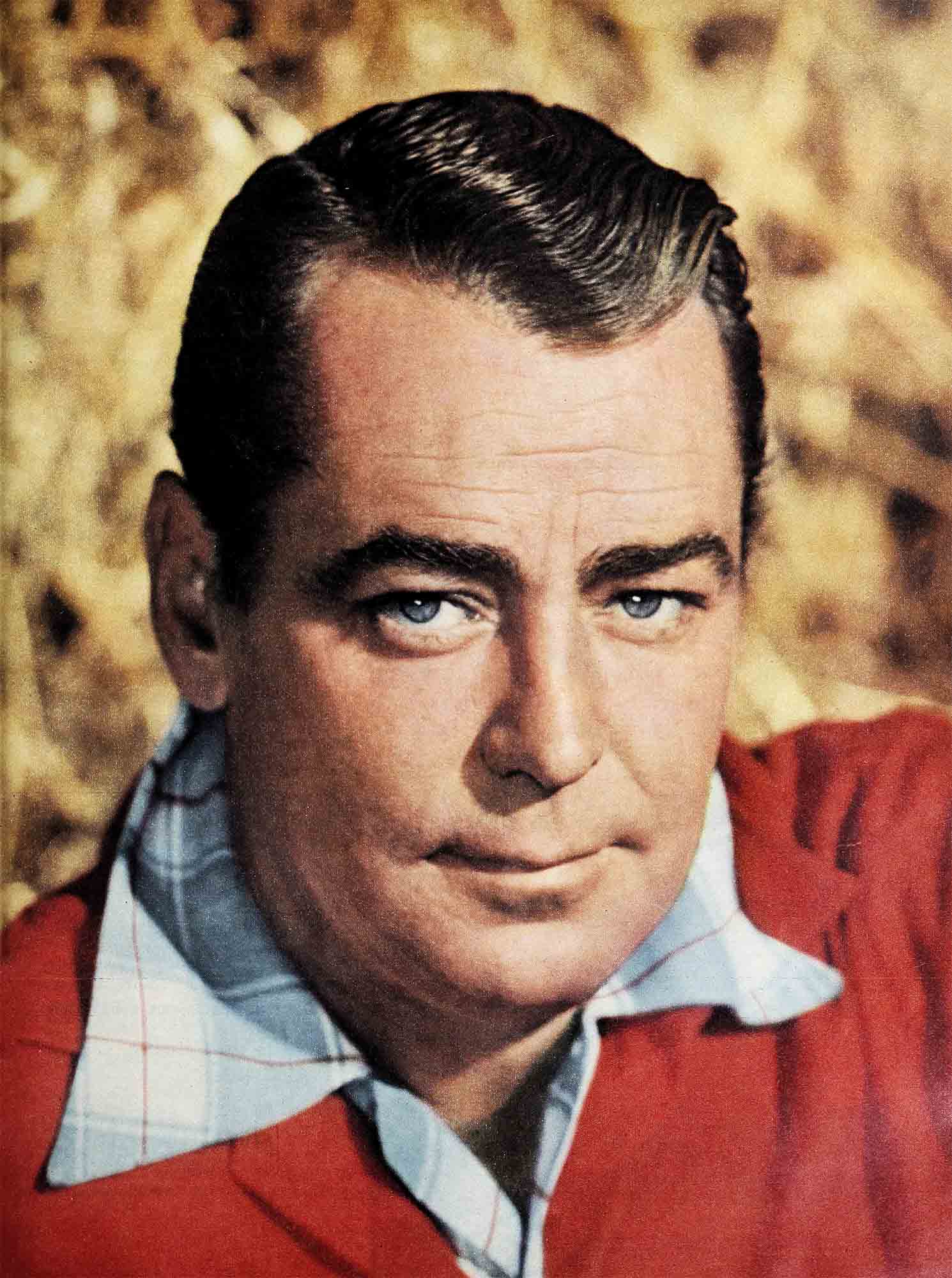
For a stilted half-hour, the conversation edged all around her, between Rock and Alan and me. Suddenly she jumped up. “My goodness!” she said. “All the other fans have gone, haven’t they? I felt so at home here I didn’t notice!”
Other American friends besides Rock came calling. Dennis and Steffi O’Keefe spent our first English Christmas with us and Bob Taylor showed up in the dashing beard he’d grown for “Knights of the Round Table.” The appearance of Lindsay Crosby (with Bing) was a special treat for Laddie, who was getting lonesome for American boys near his own age.
We felt the same kind of excitement Laddie did then, when, last summer, we reached the Canadian Rockies, where Alan made “Saskatchewan.” The mountains around Lake Louise are unbelievably beautiful, but familiar Hollywood faces in the cast and crew of the movie were even more glorious to our eyes. We loved Canada and its people, though, and we regretted that we had so little time for sight-seeing. After shooting ended, we went to Ottawa, sending our luggage ahead, since Alan just had to post-record some of the picture’s dialogue there. But a nice conductor on the train asked us, “Why don’t you go to Quebec?” On impulse, we went.
To tell the truth, I believe I took extra pleasure in this side trip just because we had so little luggage to look out for. I’d spent almost two years packing, unpacking and repacking for six people. After our travels were all over this year, one of the things that delighted me most was arranging all our clothes in the specially built closets at home.
The pool was another of our home blessings that Alan couldn’t get enough of when we returned. You know what an ardent swimmer he is. He was anxious, as well, to get the children caught up on their swimming and diving lessons. In fact, that anxiety got him into trouble while we were in Ottawa. In our hotel bedroom, he was trying to teach David how to do a back flip off a diving board. One of the children inadvertently put a chair right in Alan’s way, and he stumbled over it, breaking a bone in his foot. It wasn’t a serious injury, but it was mighty bad timing. We were sailing for Europe for the second time in just two days.
Before Alan began making “The Black Knight” in England and Spain this last trip, we went over to France and stayed at a lovely hotel near Versailles. Alan and David explored the gardens; Alana and I did the Paris shops. And this time, I made sure to keep a careful eye on my purchases. The year before, I’d returned to England from the Continent with a trunkful of presents to distribute in California—only to find the trunk empty a few weeks later. Alan had handed out all the gifts to our English friends.
From Versailles, we were supposed to go to the Command Performance in London. We were looking forward to it, with pleasant memories of our first Command Performance, when the Queen (now the Queen Mother) had inquired graciously about our children. But at the last minute, Alan came down with the flu.
We spent a second Christmas in London, Carol Lee and Laddie flying over to join us. But back they went, and the brief, tantalizing taste of being with them only made us long more intensely to have the whole family together again. Obligingly, the days speeded up. The snows of Switzerland, the neat cities of Sweden and Denmark flashed past us, as Alan hurried through his business engagements there. The Atlantic and the United States slipped away beneath us, and then came the best part of our trip—the drive through Holmby Hills to the doorway of our own house. It almost seemed to smile at us.
Proud as Alan is of his sense of direction, he once contrived to get thoroughly lost in a London fog, starting to drive from the studio to Highclere and winding up at the studio again. But Highclere was only a rented house. When our own house is his destination, he can find his way through the Hollywood hills and canyons like a homing pigeon.
That’s what we all are—a flock of homing pigeons. We feel now as if we never want to leave home again. Yet each day one of us thinks of some hilarious or heartwarming incident of our travels, and if another location trip comes up we’ll probably be as excited and eager as if the journey were our first. Or maybe we’ll be more excited. We’ve found an extra advantage in traveling: It’s made us realize with a new poignancy how very much we love coming back home, and how dear to us all our home is.
THE END
It is a quote. PHOTOPLAY MAGAZINE APRIL 1954




